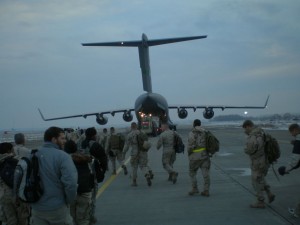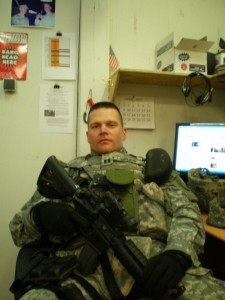9/11 Changed the Course of His Life
Tue, Sep 16th, 2014 | by Miles Mediation and Arbitration | Article | Social Share
By Jamie Miles
Most Americans remember where they were on September 11, 2001. For Atlanta attorney and Miles Mediation mediator Scott Delius, that day not only impacted his memories, it dramatically changed the course of his life.
Born and raised in Memphis, Tennessee, Scott graduated from the University of Tennessee and University of Memphis Law School. After finishing law school in 1997, he moved to Atlanta to work as an associate with two insurance defense firms. Scott decided to start his own practice in 2001. A couple of months later 9/11 happened.
Before 9/11 had you ever entertained thoughts of military life?
“It was something I always had in the back of my mind. But there was always something else to do. My dad’s retired military so that was always there – but 9/11 was the kick in the pants.”
“At the time I was 31 and didn’t get commissioned till I was 35. That’s kind of pushing it age wise.”
There’s no doubt of Delius’ determination when he has a goal in mind. Even the U.S. Military with all its procedural roadblocks was no match.

First hurdle to clear was a trip to the Military Entrance Processing Station (MEPS).
“I think I went three times and got turned away.” Having had knee and foot surgery when he was younger, Delius couldn’t even make it to the point of having a doctor examine him.
Joining the Military, Plan B.
“My recruiter said, ‘You’re a lawyer. Let’s try to get you in the Army National Guard JAG Corps.’”
On the advice of his recruiter, Delius turned to the National Guard. Admission to the Guard requires meeting the same standards as the active duty U.S. Army. Scott explained that the U.S. Army Reserve and Army National Guard fall under what he refers to as “Big Army.” Indeed, all Army soldiers, whether Active, Reserve or National Guard, belong to the U.S. Army.
“When someone goes into the National Guard a state surgeon actually lays eyes on you rather than a PA or nurse stopping you at the door. The doctor immediately saw that there was nothing bothering me. I’ve always been an athlete. So he said, ‘Sure. Come on in.’”

So you would think things really picked up in Delius’ quest to serve in the Middle East. But it was still almost two years before his persistence paid off.
“When I was at my officer basic course, I met a guy from Oregon who was going to Afghanistan the following year. That was the whole reason I joined. I wanted to go to Afghanistan because that’s where the 9/11 attacks originated. I wanted to try to make a difference. So about a year later, when the Oregon unit was getting ready to go, he called me and said, “We’ve got a spot if you want it.’”
Hurdle number two. “Georgia was fine with me going and Oregon wanted me but “Big Army” was slow to approve the transfer.”
It took six months to get the U. S. Army to agree to let him go with Oregon. The Oregon unit was about halfway through their yearlong mission when Delius finally shipped over to Afghanistan.
What were you doing?
“The reason I wanted this particular mission was because 90 percent of the time a JAG goes to Iraq or Afghanistan, we sit behind a desk. This mission was unique in that it was an Embedded Team Trainer (ETT).

“My job every day was to go out every morning with an Afghan colonel and help him and the Afghan National Army establish the Rule of Law in Afghanistan and a court on the base. We went ‘outside the wire’ every day.”
Scott lived and worked in Kabul on an American base called The Alamo. The Alamo was inside a much larger Afghan army base with about 8,000 Afghan soldiers training at one time, which Scott said could be considered the Afghan equivalent to West Point.
Most of the Afghan military leadership trained under the Soviets in the 1980s. They had a much different view of how things work. Delius said, “We were trying to get them to understand that if somebody messes up, you don’t beat them up. There are other ways of administering justice.”
A large part of his job was helping to set up an actual court, from getting approval for a space, to furniture and to finding prosecutors and judges and training them.
“People come to me and ask why have we been in Afghanistan for so long.”

“People throw around the phrase nation building. We are facilitating the development of a modern society. It’s a massive undertaking. That means everything in a country with no running water or electricity. The military has become good at it. To get modern standards – or even close – would take probably 50 years. Ten years or more is really nothing when you are trying to transform a society.”
Scott is extremely thankful for the support of his wife.
“We got married in 2002. Allyson knew about my commitment to join the military and she was supportive. When the opportunity for deployment came up she knew I wanted to do it and she was a 100 percent behind me. That makes all the difference.”
While in Afghanistan, Scott, with the help of his wife, organized humanitarian missions. Back in Atlanta, Allyson organized a clothing drive with the help of the Atlanta legal community. “She and the Atlanta legal community sent me tons of clothes and we distributed them.”

How has this experience impacted your life and work, including your mediation practice?
“The military gives me a set of experiences that is different than the other mediators. It doesn’t make me better but just a perspective that is a lot different.”
“Having been deployed downrange in Afghanistan, I have an appreciation for what is important and what is not. When you live every day wondering if you are going to be blown apart by a roadside bomb, or shot by the people you’re trying to help – that changes you fundamentally. I have little patience for the mundane or minutiae.”
“I find that I can cut through things a little more quickly as a result of my experiences. Because of my history with plaintiffs as clients, I find it very easy to talk with them at mediation. And certainly having done insurance work for many years, I can talk with adjustors too.”

Looking at the current state of our armed forces in Iraq and Afghanistan, Delius observed.
“I hope all our work sticks. The work and the sacrifice. And I hope that things progress and don’t go backwards. Sounds like we are still going to have a presence in Afghanistan which is what we need.
He explained the Status of Forces Agreement (SOFA). SOFA is an agreement between nations that when one of our soldiers does something wrong, they are not subject to the other countries’ criminal justice system. “Iraq refused to give us that so the U.S. said, ‘That’s a deal breaker and we are going home.’”
“As of now, Afghanistan is willing to give us that (SOFA), so that’s why we will probably have a presence there.”

On the eve of another September 11th anniversary, all Americans need pause and remember the past and ongoing sacrifice of our military and private citizens who are taking a stand in that volatile part of the world.
Thanks Scott!
For more information on Scott’s Afghanistan experience, please visit http://www.deliuslaw.com/firm-news/.

